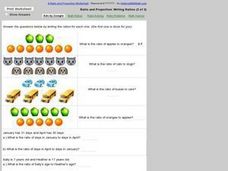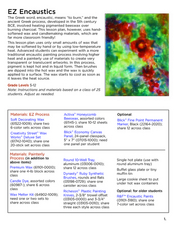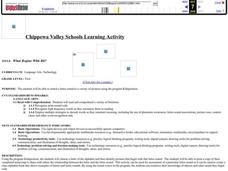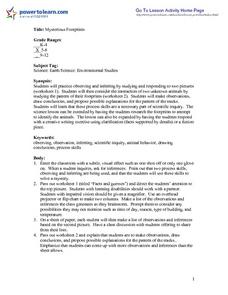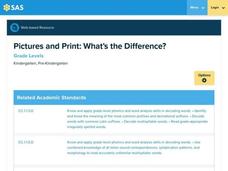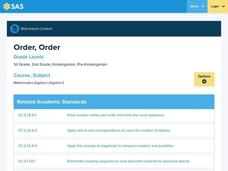Curated OER
Animal Alphabet
Review the alphabet and the sounds each letter makes before having learners identify animals whose names begin with each letter. Working in groups of four to six, they make an animal alphabet book with the letter, a picture of the animal...
Curated OER
Identifying Setting Using Evidence from the Text
Help young readers find the setting in the story. They will review what a setting is with a modeled example by the teacher. After reading The Cow Who Wouldn't Come Down by Paul Brett Johnson and completing a practice sheet,...
Curated OER
Comparing and Contrasting
Introduce your class to the concept of comparing and contrasting with this lesson. After modeling a Venn diagram, help your students find the similarities and differences between two pictures. They can then work on their own Venn...
Curated OER
Adding to Sorted Groups
First graders sort pictures of animals into categories. In this sorting lesson plan, learners use the book On The Farm to categorize their animals.
Curated OER
My Shadow Pictures
Students capture shadows for a shadow dance! They experiment with shadows created by people or items blocking light sources (sun, bright lamp) to draw their shadow pictures. Afterward, they cut out the shadows and arrange them on a large...
Helping with Math
Ratio and Proportion: Writing Ratios (2 of 2)
Elementary and middle schoolers use pictures to figure out simple ratios and complete ratio word problems. An example is done for learners in which three apples and seven oranges are displayed. The answer simply is a ratio of 3:7. The...
Curated OER
The Bible
In this bible worksheet, students view pictures and titles of stories that appear in the bible. Students can color the pictures of 6 stories.
Curated OER
Ocean Animals
Very young learners identify ocean animal pictures by their correct name and create a book of ocean animals. They read books and lean ocean animal vocabulary using the SMART Board. A well-designed lesson!
Curated OER
EZ Encaustics
Have your class design a piece of art work using a canvas panel and wax. Learners employ a Greek process of art design popular in the fifth century to create their works. This is a great way to incorporate history into an art lesson.
Curated OER
Comparing Objects
In this measurements activity, students practice the skill of choosing objects that are larger, smaller, taller, heavier and/or lighter than other objects. Students choose the multiple choice answer that best answers 7 questions.
Curated OER
Choose the Blend
In this phonics worksheet, students practice pronouncing the pictures on 16 squares. Students discover the consonant blends for each picture. Students cut out each picture and glue them in their appropriate squares on the second page.
Curated OER
Pop Shop 4 - Shopkeeping
Learners create a store where they sell pictures, tee shirts, and prints. In this store lesson plan, students learn about sales, marketing, and how to run a business.
Curated OER
imovie-ski trip
Students create a movie using pictures taken from a class ski trip. In this iMovie-ski trip lesson the students determine which pictures they would like to represent their trip. Students then begin to construct their movie by using their...
Curated OER
What Begins With Bb?
First graders match letter sounds to pictures they represent. In this matching letter sound lesson plan, 1st graders use the computer program Kidspiration to match the letter sounds to the corresponding pictures. This can be used for 1...
Curated OER
Mysterious Footprints
Students, after observing and responding to two pictures, consider the interaction of two unknown animals by examining the pattern of their footprints. They make observations, draw conclusions and propose possible explanations for the...
Curated OER
Manufacturing Technologies: Making a Picture Frame
Learners use cereal boxes, paint, buttons and glue to design and make a frame for a photograph. They consider the different processes involved in making the frame and discuss how their observations apply to manufacturing systems that are...
Curated OER
Money in the Bank
Students write and draw the pictures and words they see on each coin. They discuss the presidents or other images on the coins' faces. Students are told that each coin represents a specific amount of money. They trace their coins with...
Curated OER
Match Pictures to Numbers
Although the directions for the worksheet aren't exactly explicit, the idea is simple. Learners examine three columns of information and match them to corresponding forms of numbers. The first column contains five numbers, the second has...
Curated OER
Mark This!
In this writing and art lesson plan, students use their favorite story to draw a picture and write a caption for their picture. They create their picture and caption on a piece of tagboard that is to be used as a bookmark. A nice, simple...
Pennsylvania Department of Education
Pictures and Print: What's the Difference?
Learners watch a PowerPoint presentation. In this early literacy lesson, students watch a PowerPoint presentation describing print from pictures and the difference between the two.
Pennsylvania Department of Education
Order, Order
Students use pictures to identify items as ordinal numbers. In this ordinal numbers lesson plan, students use the words "before" and "after" to identify the pictures as well.
Curated OER
Compound Word Game
Students create compound words in teams based on pictures they see on the board. In this compound word lesson plan, students have 5 minutes to come up with as many compound words as they can.
Curated OER
Me on the Map: Homes, Neighborhoods, and Communities
Students read a book about maps and identify the differences between a picture and a map. In this maps lesson plan, students also label maps of their home, neighborhood, and community.
Curated OER
Dividing into Two Parts — Halves
In this fractions worksheet, students divide pictures into halves to introduce them to fractions. Students complete 3 sets of problems.







